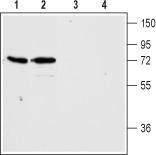Hrh3 Rabbit Polyclonal Antibody
Other products for "Hrh3"
Specifications
| Product Data | |
| Applications | IHC, WB |
| Recommended Dilution | WB: 1:200-1:2000; IHC: 1:100-1:3000 |
| Reactivities | Mouse, Rat |
| Host | Rabbit |
| Clonality | Polyclonal |
| Immunogen | Peptide (C)RTRLRLDGGREAGPE, corresponding to amino acids 228-242 of rat H3 Histamine Receptor. 3rd intracellular loop. |
| Formulation | Lyophilized. Concentration before lyophilization ~0.8mg/ml (lot dependent, please refer to CoA along with shipment for actual concentration). Buffer before lyophilization: Phosphate buffered saline (PBS), pH 7.4, 1% BSA, 0.025% NaN3. |
| Purification | Affinity purified on immobilized antigen. |
| Conjugation | Unconjugated |
| Storage | Store at -20°C as received. |
| Stability | Stable for 12 months from date of receipt. |
| Gene Name | histamine receptor H3 |
| Database Link | |
| Background | Histamine (2-[4-imidazole]ethylamine) is a low-molecular-weight amine synthesized from L-histidine. It is produced by various cells throughout the body, including central nervous system neurons, gastric mucosa parietal cells, mast cells, basophils and lymphocytes. Histamine is a major biological mediator whose functions include, among many others, regulation of vascular smooth muscle, immune regulation, regulation of sleep-wake cycles and regulation of gastric acid secretion. The biological effects of histamine are mediated through four receptors (H1- H4 Histamine receptors) all of which belong to the 7-transmembrane domain, G protein-coupled receptor (GPCR) superfamily. H3 Histamine Receptor couples to Gi/G0 proteins and receptor activation leads to inhibition of adenylate cyclase, activation of the mitogen-activated protein kinase (MAPK) cascade and inhibition of the Na+/H+ exchanger. H3 receptors are expressed primarily in the central nervous system (CNS) where they are located in presynaptic membranes of histaminergic neurons, where they negatively regulate the synthesis and release of histamine. In addition, H3 receptors are also located on nonhistaminergic neurons, where they regulate the release of other amines such as dopamine, serotonin, and norepinephrine. Based on these studies, a central role for H3 receptors has been proposed in disorders involving cognition such as attention deficit and hyperactivity disorder (ADHD), Alzheimer disease and schizophrenia as well as sleep and energy homeostasis (i.e. obesity) disorders. |
| Synonyms | GPCR97; HH3R |
| Reference Data | |
Documents
| Product Manuals |
| FAQs |
{0} Product Review(s)
0 Product Review(s)
Submit review
Be the first one to submit a review
Product Citations
*Delivery time may vary from web posted schedule. Occasional delays may occur due to unforeseen
complexities in the preparation of your product. International customers may expect an additional 1-2 weeks
in shipping.






























































































































































































































































 Germany
Germany
 Japan
Japan
 United Kingdom
United Kingdom
 China
China




